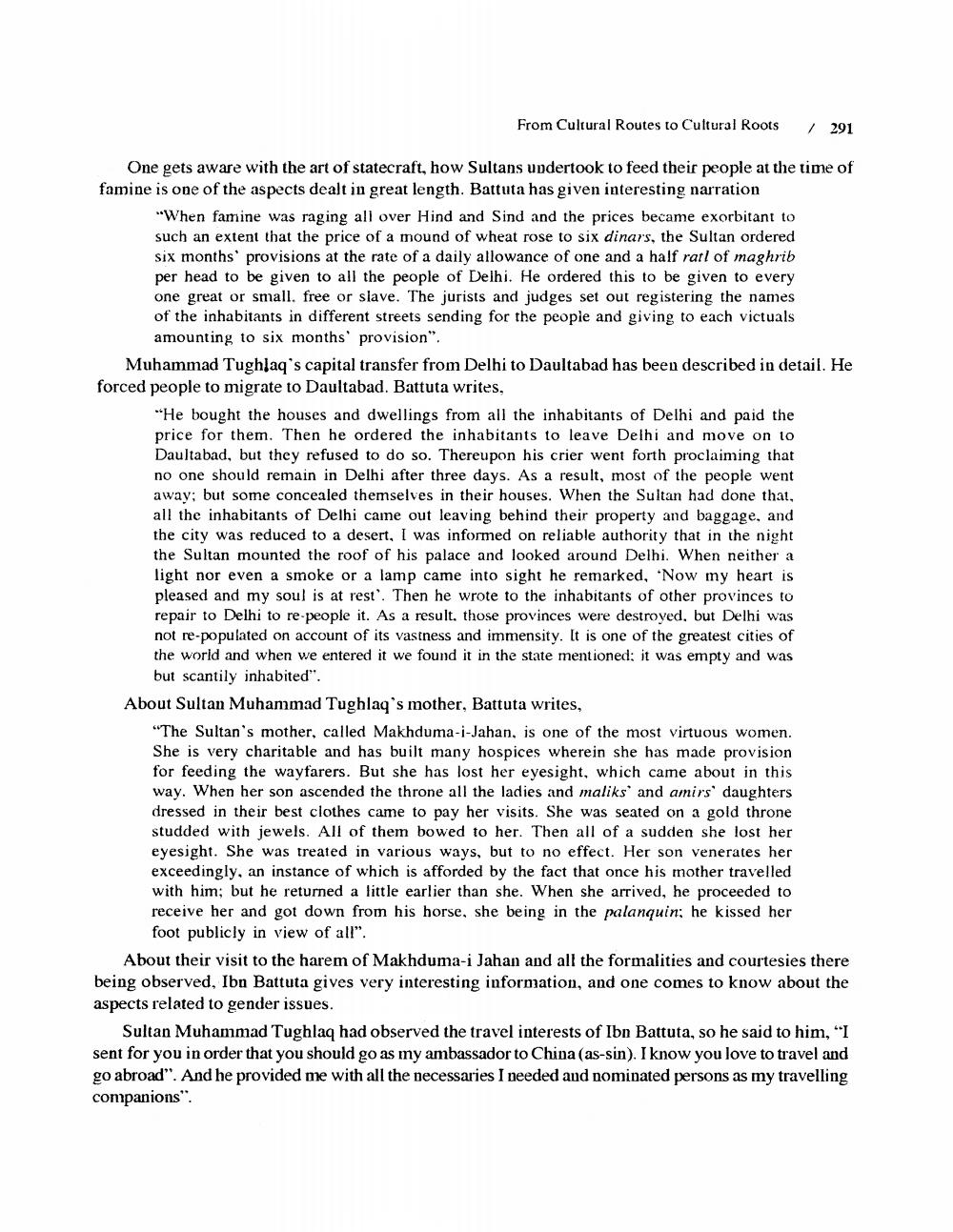________________
From Cultural Routes to Cultural Roots / 291
One gets aware with the art of statecraft, how Sultans undertook to feed their people at the time of famine is one of the aspects dealt in great length. Battuta has given interesting narration
"When famine was raging all over Hind and Sind and the prices became exorbitant to such an extent that the price of a mound of wheat rose to six dinars, the Sultan ordered six months' provisions at the rate of a daily allowance of one and a half rail of maghrib per head to be given to all the people of Delhi. He ordered this to be given to every one great or small. free or slave. The jurists and judges set out registering the names of the inhabitants in different streets sending for the people and giving to each victuals amounting to six months' provision".
Muhammad Tughlaq's capital transfer from Delhi to Daultabad has been described in detail. He forced people to migrate to Daultabad. Battuta writes,
"He bought the houses and dwellings from all the inhabitants of Delhi and paid the price for them. Then he ordered the inhabitants to leave Delhi and move on to Daultabad, but they refused to do so. Thereupon his crier went forth proclaiming that no one should remain in Delhi after three days. As a result, most of the people went away; but some concealed themselves in their houses. When the Sultan had done that, all the inhabitants of Delhi came out leaving behind their property and baggage, and the city was reduced to a desert, I was informed on reliable authority that in the night the Sultan mounted the roof of his palace and looked around Delhi. When neither a light nor even a smoke or a lamp came into sight he remarked, 'Now my heart is pleased and my soul is at rest'. Then he wrote to the inhabitants of other provinces to repair to Delhi to re-people it. As a result, those provinces were destroyed, but Delhi was not re-populated on account of its vastness and immensity. It is one of the greatest cities of the world and when we entered it we found it in the state mentioned: it was empty and was but scantily inhabited".
About Sultan Muhammad Tughlaq's mother, Battuta writes,
"The Sultan's mother, called Makhduma-i-Jahan, is one of the most virtuous women. She is very charitable and has built many hospices wherein she has made provision for feeding the wayfarers. But she has lost her eyesight, which came about in this way. When her son ascended the throne all the ladies and maliks' and amirs' daughters dressed in their best clothes came to pay her visits. She was seated on a gold throne studded with jewels. All of them bowed to her. Then all of a sudden she lost her eyesight. She was treated in various ways, but to no effect. Her son venerates her exceedingly, an instance of which is afforded by the fact that once his mother travelled with him; but he returned a little earlier than she. When she arrived, he proceeded to receive her and got down from his horse, she being in the palanquin; he kissed her foot publicly in view of all".
About their visit to the harem of Makhduma-i Jahan and all the formalities and courtesies there being observed, Ibn Battuta gives very interesting information, and one comes to know about the aspects related to gender issues.
Sultan Muhammad Tughlaq had observed the travel interests of Ibn Battuta, so he said to him, "I sent for you in order that you should go as my ambassador to China (as-sin). I know you love to travel and go abroad". And he provided me with all the necessaries I needed and nominated persons as my travelling companions".




